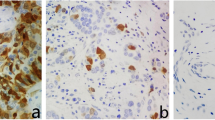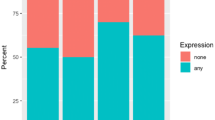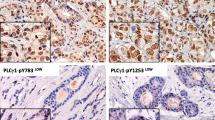Abstract
Protein tyrosine kinases (PTKs) play a major role in the transduction of intracellular mitogenic signal. PTKs are also involved in the process of cellular transformation. A number of studies have reported increased PTK activities in cytosolic fractions from human breast carcinoma. However, the possible pronostic value of these activities is difficult to establish from these studies, mostly conducted on limited numbers of patients. In order to clear up the issue, we have investigated a large series of patients with a long follow-up, using a retrospective multicentric study (894 breast cancers T1-T2, N0-N1, M0; median follow-up: 67 months). PTKs were measured using a radioenzymatic assay as described in our previously report. We confirmed the already observed correlation between PTK activities and Scarff–Bloom grading (p > 10−5), negative estrogen receptor (ER), and progesterone receptor (PR) status. By contrast, we found in this study a correlation between PTK values and clinical nodal status (p = 0.00027) not showed in our precedent analysis. In Cox multivariate analysis, PTK activity does not emerge as a significant pronostic parameter. On the other hand, tumor PTK activity assay may prove of great interest in clinical research using newly developed tyrosine kinase inhibitors in order to assess their biological impact and eventually to predict the responsiveness to these new therapeutic agents.
Similar content being viewed by others
References
Hunter T, Cooper JA: Protein tyrosine kinases. Ann Rev Biochem54: 897–930, 1985
Ullrich A, Schlessinger J: Signal transduction by receptors with tyrosine kinase activity. Cell 61: 203–212, 1990
Druker BJ, Mamon HJ, Roberts TM: Oncogenes growth factors and signal transduction. N Engl J Med 321: 1383–1391, 1989
Heldin CH, Westermark B: Growth factors as transforming proteins. Eur J Biochem 184: 487–496, 1989
Hennipman A, Van Oirschot BA, Smits J, Rijksen G, Stall GEJ: Tyrosine kinase activity in breast cancer, benign breast disease and normal breast tissue. Cancer Res 49: 516–521, 1989
Durocher Y, Chevalier S: Protein tyrosine kinases in human breast cancer: kinetic properties and evidence for the presence of two forms of native enzyme. Breast Cancer ResTreat 17: 99–107, 1990
Ottenhoff-Kalff AE, Rijksen G, van Beurden EACM, Hennip-man A, Michels AA, Staal GEJ: Characterisation of protein tyrosine kinases from human breast cancer: involvement of the c-Src oncogene product. Cancer Res 52: 4773–4778, 1992
Bolla M, Rostaing-Puissant B, Chedin M, Souvignet C, Marron-Charrière J, Colonna M, Berland E, Chambaz EM: Protein tyrosine kinase activity as a prognostic parameter in breast cancer, a pilot study. Breast Cancer Res Treat 26: 283–287, 1993
Romain S, Chinot O, Klijn JGM, van Putten WLJ, Guirou O, Look M, Martin PM, Foekens JA: Prognostic value of cytoso-lic tyrosine kinase activity in 249 node-positive breast cancer patients. Br J Cancer 70: 304–308, 1994
Bolla M, Rostaing-Puissant B, Bottari SP, Chedin M, Marron-Charrière J, Colonna M, Berland E, Chambaz EM: Protein tyrosine kinase activity in 350 T1-T2, N0-N1 breast cancer: preliminary results. Breast Cancer Res Treat 39: 327–334, 1996
Spyratos F, Romain S, Rostaing-Puissant B, Daver A, Colonna M, Descotes F, Martin PM, Bougnoux P, Roth H, Bolla M: Standardisation and quality control in the evaluation of prolif-eration parameters in T1-T2, N0-N1, M0 breast cancer. Bull Cancer 86 (7–8): 678-684, 1999.
Noonberg SB, Benz CC: Tyrosine kinase inhibitors targeted to the epidermal growth factor receptor sufamily: role as anticancer agents. Drugs 59: 753–767, 2000
Wood JM: Inhibition of vascular endothelial growth factor (VEGF) as a novel approach for cancer therapy. Medicina 60: 41–47, 2000
Raymond E, Faivre S, Armand JP: Epidermal growth factor re-ceptor tyrosine kinase as a target for anticancer therapy. Drugs 60: 15–23, 2000
Sharma SV, Oneyama C, Yamashita Y, Nakano H, Sugawara K, Hamada M, Kosaka N, Tamaoki T: UCS15A, a non-kinase inhibitor of Src signal transduction. Oncogene 20: 2068–2079, 2001
Ciardiello F, Caputo R, Bianco R, Damiano V, Fontanini G, Cuccato S, De Placido S, Bianco AR, Tortora G: Inhibition of growth factor production and angiogenesis in human cancer cells by ZD1839 (Iressa), a selective epidermal growth factor receptor tyrosine kinase inhibitor. Clin Cancer Res 7: 1459–1465, 2001
Nakagawa K: Tyrosine kinase inhibitors-solid cancers. Gan To Kagaku Ryoho 28: 608–613, 2001
Meric JB, Faivre S, Monnerat C, Adi Vago N, Le Chevalier T, Armand JP, Raymond E: Zd 1839 'Iressa'. Bull Cancer87: 873–876, 2000
Akimoto T, Nonaka T, Ishiwaka H, Sakurai H, Saitoh JI, Takahashi T, Mitsuhashi N: Genistein, a tyrosine kinase in-hibitor, enhanced radiosensitivity in human esophageal cancer cell lines in vitro: possible involvement of inhibition of sur-vival signal transduction pathways. Int J Radiat Oncol Biol Phys 50: 195–201, 2001
Martin PM: Méthodes de détection et de quantification des récepteurs hormonaux dans le cancer du sein. Path Biologie 31: 723–740, 1983
Delarue JC, Friedman S, Mouriesse H, May-Levin, Sancho-Garnier H, Contesso G: Epidermal growth factor in human breast cancer; correlation with estrogen and progesterone receptors. Breast Cancer Res Treat 11: 173–178, 1988
Chedin M, Filhol O, Duminy C, Bolla M, Benistant C, Roche S, Chambaz EM, Cochet C: Characterisation of two differ-ent cytoplasmic protein tyrosine kinases from human breast cancer. Carcinogenesis 18: 1463–1472, 1997
Levitzki A: Src as a target for anti-cancer drugs. Anti-Cancer Drug Design 11: 175–182, 1996
Talamonti MS, Roh MS, Curley SA, Gallick GE: Increase in activity and level of pp60 c-Src in progressive stages of human colorectal cancer. J Clin Invest 91: 53–60, 1993
Muthuswamy SK, Siegel PM, Dankort DL, Webster MA, Muller WJ: Mammary tumors expressing the neu proto-oncogene possess elevated c-Src tyrosine kinase activity. Mol Cell Biol 14: 735–743, 1994
Mitchell PJ, Barker KT, Martindale JE, Kamalati T, Lowe PN, Page MJ, Gusterson BA, Crompton MR: Cloning and charac-terisation of cDNAs encoding a novel non-receptor tyrosine kinase, brk, expressed in human breast tumors. Oncogene 9: 2383–2390, 1994
Sun G, Sharma AK, Budde R: Autophosphorylation of Src and Yes blocks their inactivation by Csk phosphorylation. Oncogene 17: 1587–1595, 1998
Egan C, Pang A, Durda D, Cheng HC, Wang JH, Fujita DJ: Activation of Src in human breast tumor cell lines: elevated levels of phosphotyrosine phosphatase activity that preferen-tially recognizes the Src carboxy terminal negative regulatory tyrosine 530. Oncogene 18: 1227–1237, 1999
Ottenhoff-Kalff AE, Van Oirschot BA, Hennipman A, de Weger RA, Staal GE, Rijksen G: Protein tyrosine phosphatase activity as a diagnostic parameter in breast cancer. Breast Cancer Res 33: 245–256, 1995
Author information
Authors and Affiliations
Rights and permissions
About this article
Cite this article
Rostaing-Puissant, B., Chambaz, E.M., Romain, S. et al. Prognostic Assessment Of PTK Activity in T1-T2, N0-N1, M0 Breast Cancer: A Multicentric Retrospective Study. Breast Cancer Res Treat 74, 135–141 (2002). https://doi.org/10.1023/A:1016157901500
Issue Date:
DOI: https://doi.org/10.1023/A:1016157901500




